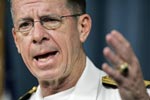 AP: Iraq’s indecision on whether to ask American forces to stay beyond the end of the year is pushing the U.S. close to the point where a smooth, safe troop withdrawal will be jeopardized, the top U.S. military officer said Monday as he arrived in the country.
AP: Iraq’s indecision on whether to ask American forces to stay beyond the end of the year is pushing the U.S. close to the point where a smooth, safe troop withdrawal will be jeopardized, the top U.S. military officer said Monday as he arrived in the country.
The Associated Press
By LOLITA C. BALDOR, Associated Press
 MOSUL, Iraq (AP) — Iraq’s indecision on whether to ask American forces to stay beyond the end of the year is pushing the U.S. close to the point where a smooth, safe troop withdrawal will be jeopardized, the top U.S. military officer said Monday as he arrived in the country.
MOSUL, Iraq (AP) — Iraq’s indecision on whether to ask American forces to stay beyond the end of the year is pushing the U.S. close to the point where a smooth, safe troop withdrawal will be jeopardized, the top U.S. military officer said Monday as he arrived in the country.
Adm. Mike Mullen, chairman of the Joint Chiefs of Staff, said that American and Iraqi operations over the last several weeks have tamped down a recent surge in violence there, but he’s not sure how long that will last.
“Now is the time. We have to know,” said Mullen, speaking to reporters just before landing in Mosul. The U.S., he said, is nearly at the point where it will be difficult to pull forces out while still providing support and advice to the Iraqis, maintain security and keep the troops protected.
His visit comes as the U.S. is growing increasingly frustrated with Iraqi leaders’ failure to agree on whether they will ask American troops to remain in the country beyond the end of the year, when all but a small contingent of forces are required to leave under an agreement signed in 2008. The decision’s importance is underscored by a recent spate of violent attacks and assassinations, along with a report suggesting that Iraq is more dangerous now than it was last year.
Mullen would provide no details about recent Iraq and U.S. actions in reaction to the violence. But, he said it included “operations with them or in support of them” as well as political moves.
“The results of that, over the course of the last two or three weeks, have been pretty significant, but I’m still in the wait-and-see mode about whether this will be sustained,” he said.
Mullen was more restrained about the indecision on the troop issue than Defense Secretary Leon Panetta, who called for swift action when he was in Baghdad last month, and chafed, “”Damn it, make a decision.”
Mullen said the Iraqis are working to make a decision and they know Washington isn’t bluffing when it says the U.S. is reaching a point when it would be difficult to reverse detailed plans to pull out the roughly 46,000 troops that remain.
He said he hopes to get a better understanding during his visit of where the Iraqis are in their decision process.
Mullen also echoed U.S. worries about Iran’s stepped up efforts to arm militants in Iraq with more dangerous and sophisticated weapons. He also said that increased influence by Iran on the Iraqis presents a risk to the region. How the U.S. counters that risk, he said, will depend on what Iraq decides on the troop request.
Iraqi Prime Minister Nouri al-Maliki on Sunday reaffirmed Iraq’s desire for fighter jets and trainers to help operate and maintain them. And Mullen said that both Baghdad and the U.S. are very well aware of Iraq’s military strengths and weaknesses, including its need for air support..
Prior to his remarks, al-Maliki had met with Parliament after Iraq’s top political leaders postponed, for the second time in a week, a meeting to discuss whether U.S. troops should be asked to stay.
The 2008 security agreement requires that all U.S. forces must leave the country by Dec. 31, but officials from both countries acknowledge that Iraq is still too unstable to protect itself without U.S. help. Without a change in the agreement, less than 200 U.S. forces would stay in the country to provide protection and other assistance at the American Embassy.
After eight years of war, many Iraqis are reluctant to see an extended U.S. military presence, and anti-American cleric Muqtada al-Sadr has pressed to drive out the U.S. military.
While agreeing that Sadr has been a challenge, Mullen said Monday that the cleric is “not driving what is going on.”
Mullen traveled to Iraq after three days in Afghanistan where he met with military commanders about security progress and the evolving plans to begin withdrawing U.S. troops. President Barack Obama has said that 10,000 U.S. troops will come out of Afghanistan by the end of this year, and another 23,000 by fall 2012.


